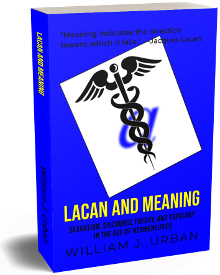LACAN AND MEANING
SEXUATION, DISCOURSE THEORY, AND TOPOLOGY IN THE AGE OF HERMENEUTICS
CHAPTER 3
LACAN ON MEANING
— page 55 —
‘[s]ymbols in fact envelop the life of man with a network so total that they join together those who are going to engender him “by bone and flesh” before he comes into the world; so total that they bring to his birth, along with the gift of the stars, if not with the gifts of the fairies, the shape of his destiny; so total that they provide the words that will make him faithful or renegade, the law of the acts that will follow him right to the very place where he is not yet and beyond his very death; and so total that through them his end finds its meaning in the last judgment, where the Word absolves his being or condemns it – unless he reaches the subjective realization of being-towards-death.’9
Speaking even earlier about the Word, ‘the world of things will situate itself’ in ‘a language’s world of meaning.’10 Lines like these could have easily been written by Ebeling, Gadamer, Ricoeur or anyone well-versed in Heideggerian hermeneutical phenomenology. At this point in Lacan’s career it is clear that the meaning-dense symbol forms the structure and limit of the psychoanalytic field.
Consequentially, the experience of self-dispossession is attributable to the subject’s alienation from its most primordial and meaningful being. The task of psychoanalysis is thus one of reestablishing a link to this ontological dimension, or else to compensate for its loss with a renarrativization of the subject’s history. The use of the futur antérieur – a French verbal declension that marks what ‘will have been’ the case after a particular future moment has lapsed – problematizes simple conceptions of meaning-conferment by adding a complex temporal dimension. This in large part accounts for Lacan’s opposition to determinist lines of thinking which consider events in the subject’s past as simple facts. On the contrary, for Lacan such events are always already historicized so that what is important is how the subject today perceives them to have been experienced. Here is where the psychoanalyst may be of assistance:
‘What we teach the subject to recognize as his unconscious is his history – in other words, we help him complete the current historicization of the facts that have already determined a certain number of the historical “turning points” in his existence. But if they have played this role, it is already as historical facts, that is, as recognized in a certain sense or censored in a certain order.’11
He provides an example by way of the anal stage to illustrate that what is at stake is not the fact of toilet training as such but whether the subject registers it as a victory or as a defeat. It should also be noted that Lacan claims such ‘restructurings of the event after the fact,’ which in French would be rendered by the term après coup, are in line with Freud’s notion of Nachträglichkeit or deferred action.12 This implies that any event takes on its full meaning only at a
9 Ibid., 231.
10 Ibid., 228.
11 Ibid., 217.
12 Ibid., 213. This logic is equally applicable to the reading given texts. So in no way can the writings of Heidegger, Husserl, Derrida, Nancy, Freud or any other be taken as a
full text of Lacan and Meaning
FREE Lacanian-themed puzzles

